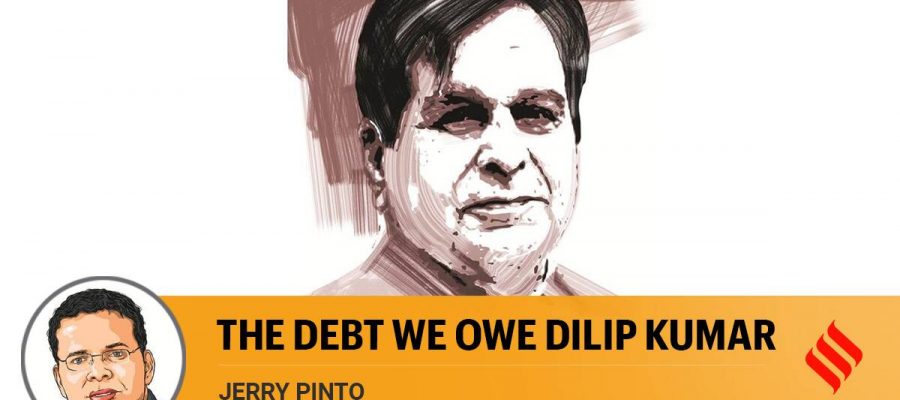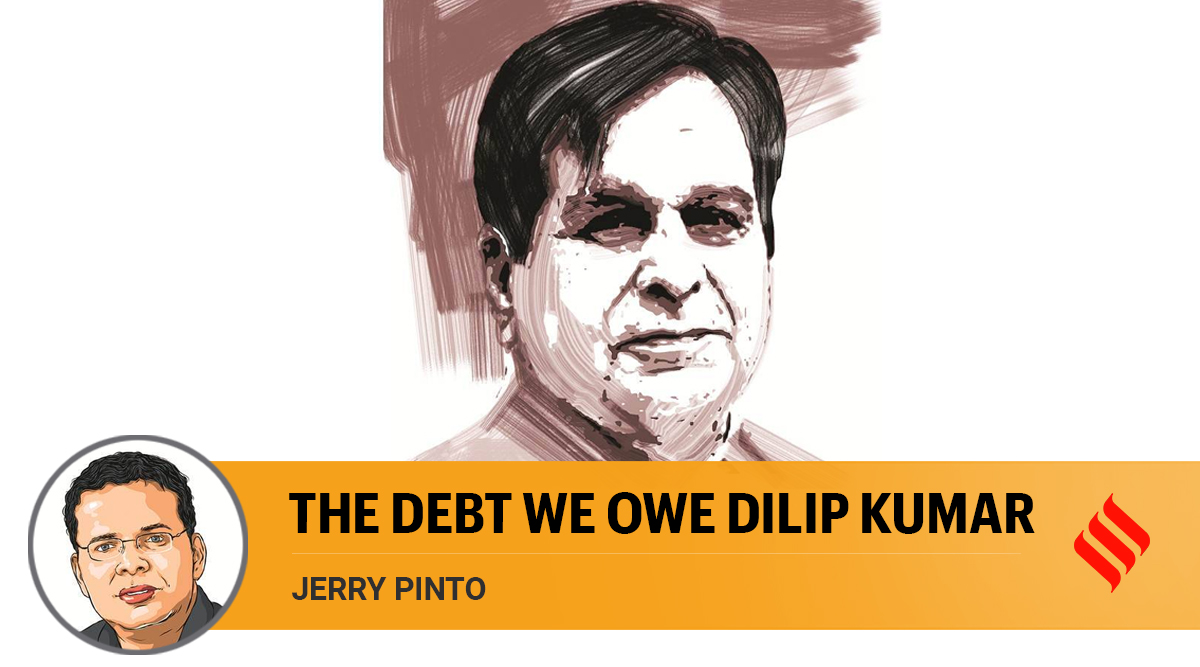Jerry Pinto writes: Dilip Kumar taught us the power of suggestion and left spaces in his characters for us to write in our victories and defeats.
In the 1950s, even as the nation struggled to find self-definition in a polarised world, three men strove to determine what masculinity meant in Hindi cinema. There was the naïve (Raj Kapoor), the urbane (Dev Anand) and the intense (Dilip Kumar). With the passing of Dilip Kumar, the last of the founding fathers has departed. We tend to look back at the 1950s not just as the golden age of cinema but as some sort of paradise, from which decades of bad decisions and spineless compromises have driven us. Dilip Kumar was not born Dilip Kumar, he was born Yusuf Khan. Meena Kumari was Mahjabeen. Madhubala was Mumtaz Jaan. Yes, it was a better time. No, it was not paradise.
Dilip Kumar had a rough start. He was derided as a monkey by an editor who should have known better. And when he came into his own, when his masculine beauty emerged from the chrysalis, when his intelligence came to power some of the most extraordinary performances we had seen, he became the Tragedy King. I have never trusted the Devdas trope; this is a man who loses his Oedipal struggle, and emasculated, he can neither reach out for love nor can he accept it. He can only die, but watching Dilip Kumar’s Devdas yearn for Paro (Suchitra Sen) while rejecting Vyjayanthimala’s Chandramukhi, you understood what it meant. This was how it would be in a gerontocracy that silences the young. This was how the patriarchy would scar the young: Devdas lashes out at a woman because he cannot symbolically kill his father; and he will reject another woman because love might save him and he does not want to be saved because there is nothing left to save in that hollow shell. Dilip Kumar must have read this, or something similar in the text. For he was one of the first stars to talk about his depression, about having to seek help and being told to go and find some fun films to do.
He must have seen too in Ram aur Shyam, the way in which the self must be split and sewn together again in an act of rebellion. He must have seen how improbable the Naya Daur end was, the horse beating the horsepower of a bus engine. He must have known that most of the films he worked in were improbable and his characters built out of the straw of melodrama — easy to burn, but nothing inside to warm your hands.
I was born too late for Dilip Kumar. Mine was the era of Amitabh Bachchan who unwittingly took elements from the naïve (Kaalia, Yaaraana) and the urbane (Don, The Great Gambler) and the intense (Muqaddar ka Sikandar, Silsila) to shape his own version of our masculinity. And so, for me, Dilip Kumar is Vinod Kumar from Mashaal. There is a peculiar doubling to his character too. As an upright editor, Vinod Kumar is forced on to the streets when his wife (Waheeda Rehman) is ill. He loses her that night and he turns to crime. This scene is played out with such bravura, such a magnificent melodramatic over-the-topness that it is never wrong because there is nothing to compare it with. And just when you think the character has peaked, he must explain his going over to the dark side to a younger self (Raja played by Anil Kapoor) and I remember watching the scene very, very tense. This was because Mashaal was released in 1984 and we had fallen out of love with Bollywood. The 1970s seemed a distant memory when we could so easily fall in love, with Sholay and Amar Akbar Anthony as much as with Bhumika and Nishant. I was only “doing timepass” and then Mashaal blindsided me. I was involved but I had also watched enough cinema to know that this retelling on a deserted street could go horribly wrong if Dilip Kumar were to sob once too often or muff one line. He didn’t. He came through. He was brilliant. He was more than brilliant: He took the straw of that melodrama and he made it burn as if it were heartwood at which we could all warm our cold and cynical hearts.
Another doubling happened for me in Shakti, where the past and the present were brought together in another Oedipal conflict. Deewaar had its “Mere paas maa hai” played between two brothers; Shakti was much more sophisticated. Father and son meet at the sea and, once again, they play out the battle of good vs evil; and in the death of the son, the old order is saved in the manner of the angel in Wilfred Owen’s great reworking of the myth of Abraham and his son.
This is our debt to Dilip Kumar.
I remember the exact tone of voice in which he said, “Mujhe sochne do, Sheetal” in Shakti, when his son is kidnapped and he must decide between father and policeman; the expression on his face as he divides the rose between Anarkali and Bahar in Mughal-e Azam; the wonderful one-foot hop in Naya Daur’s Udein jab jab zulfein teri (perhaps the first time that a song praised a man’s hair).
Dilip Kumar cleaned our palates. He taught us the power of suggestion. He left spaces in his characters for us to write in our victories and defeats. When I look at Irrfan Khan and Nawazuddin Siddiqui, both of whom are magnificent actors, I can see how much they owe to Dilip Kumar and how much easier their task is since they play ordinary people. Dilip Kumar was asked to play extraordinary people, but he brought to it the ordinary magic of empathy. And that is the debt we all owe him.
This column first appeared in the print edition on July 9, 2021 under the title ‘The debt we owe Dilip Kumar’. Pinto is the author of Helen: the life and times of a Bollywood H-Bomb and the editor of The Greatest Show on Earth; Writings about Bollywood.
Source: Read Full Article



